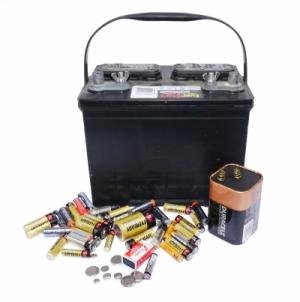
All batteries contain toxic and corrosive chemicals that can hurt people and contaminate soil and water. If disposed of with trash or mixed with other recyclables batteries even start fires that damage recycling facilities and put workers at risk. Keep batteries out of trash or mixed recycle bins and see options for some specific types of batteries below.
Many curbside recycling programs accept clear plastic bags of household single-use and rechargable batteries placed on top of the recycling cart. Check your local curbside program. Auto batteries, solar and other power storage batteries are not household batteries.
Additionally, household batteries can be dropped off for free at household hazardous waste facilities, public libraries, and at many hardware stores and pharmacies. Click here for local drop-off options.
Safety
To prevent battery fires, store collected batteries safely in a container kept in a cool, dry place to prevent damage. Cover the terminals of batteries with clear sticky insulating tape. Prevent water or any other substance from getting into the battery container. For damaged, defective or recalled, leaking, or "puffy" batteries, residents and small businesses should use/contact their HHW Facility while large businesses may contact a hazardous waste pick-up company for safe disposal instead of a community drop-off site.
Car and Boat Batteries
Larger standard batteries from personal vehicles cannot be recycled through your local curbside program. Here are drop-off options that include local auto part stores. Find out how to prepare your old car battery for drop-off.
Lithium Batteries
These batteries, which are often the rechargeable kind, are marked with “Lithium” or “Li” or “Li-ion”. Tape over the ends of these batteries to get them ready for recycling. Left uncovered, they can cause fires if they come in contact with other batteries.
Toys and Electric Items with Batteries
Unwanted toys and electric items with batteries must not be put in a curbside recycle or trash bin. If the item is in good shape - consider donating; if not, and the batteries are user-removable, please take batteries out and donate the item. Find out what to do with broken electronic toys here. If batteries cannot be removed and/or if the item is an electronic device, it must be recycled as E-Waste – see options here.
Cell Phones & Cell Phone Batteries
If in working condition, sell or donate your cell phone. Non-working cell phones should be treated as e-waste and recycled properly. Remove the battery as possible for recycling if it no longer takes a charge. Click here for cell phone local drop-off options.
Electric Vehicle & E-Bike Batteries
Batteries from a personal electric vehicle like a bike, scooter, hoverboard or skateboard are high power lithium batteries that present risks of catching on fire if mishandled. Return the item to the dealer for safe handling and recycling. E-bike batteries now have drop-off locations through Call2Recycle.
Batteries from electric cars, motorcycles and mobility carts should not be removed or serviced except by an authorized technician or the dealer. Click here for information on EV batteries.
Sustainable Alternatives
Opt for Rechargeable
Most single-use batteries can be replaced by rechargeable ones, and can often save you money in the long run. StopWaste's Rechargable Batteries fact sheet provides additional details on when and where it's good to use rechargeables.
Conserve Battery Life
Try conserving the battery life of your electronics so you can get more use out of those batteries. Turn off battery-powered devices when they’re not in use, and avoid exposing electronics to cold conditions.
Check your local curbside program and visit Call2Recycle.org for more information on battery recycling and disposal.

